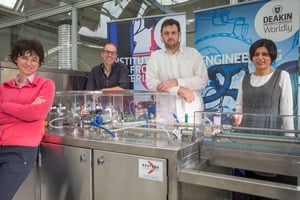High tech nanofibre deal for Deakin
Research news
A deal has just been sealed that will see world-leading short nanofibre manufacturing begin at commercial scale at Deakin in Geelong – with the promise of jobs and new associated industries for the region.
A joint venture between Geelong biotechnology company Cytomatrix and the Swiss textiles company HeiQ Materials AG will see the formation of HeiQ Australia, which will develop the enterprise in Geelong.
In addition, HeiQ Australia has also entered into a collaborative research agreement with Deakin University that will see $2 million committed to research during its first five years, to explore potential applications for short nanofibres in areas ranging from biotechnology, to textiles and filtration.
HeiQ Australia will begin its manufacturing operations at Deakin’s Institute for Frontier Materials (IFM) at Waurn Ponds, where existing methodology and equipment will be scaled up for commercial production.
“This announcement illustrates the importance Deakin places on partnerships and collaboration, from both a research and commercial point of view,” said Deakin’s Deputy Vice-Chancellor (Research) Professor Lee Astheimer.”
“We have been working in partnership with Cytomatrix to develop high-value short nanofibres and this new joint venture will allow us to take the next step in the ground-breaking work we are doing in this important area.”
The short nanofibre technology was developed by Deakin researchers working in collaboration with Cytomatrix and funded through grants from the Advanced Manufacturing CRC.
A short nanofibre production machine and platform that will form the basis of HeiQ Australia were developed through a partnership between Deakin, Cytomatrix and Geelong engineering firm, Austeng. They were funded through a $500,000 grant from the Skilling the Bay program.
The production machine was awarded a 2014 Victorian Engineering Excellence Award in September.
Geelong-based Dr Murray Height, Chief Executive of HeiQ Australia, said there has already been commercial interest from other companies for short nanofibres, which is “very promising for high tech jobs in Geelong and Deakin.”
Associate Professor Mark Kirkland, Chief Scientific Officer at Cytomatrix and Team Leader in Biomaterials at the IFM, said that Cytomatrix was pleased “to enter into a long-term commercial and research agreement with HeiQ Australia - an entrepreneurial and rapidly growing business with the same focus on growth that we have.”
Deakin’s chief researcher on short nanofibres, Dr Alessandra Sutti, said that the nanofibres are made in a liquid medium from fibres that are sheared by force to meet the required size.
“Thanks to IFM's soft matter expertise and the additive-manufacturing and modelling capabilities of Deakin's School of Engineering, the technological platform offers a level of flexibility unparalleled by other nanofibre manufacturing techniques,” Dr Sutti said.
“Our production control is unique. We have achieved very fine control of the fibre diameter and are able to produce short nanofibres from a range of materials, including natural proteins and polymer fibres that will be attractive to manufacturers from diverse industries.”
Share this story
 Short nanofibre experts, with the world-leading technology - (from left) Deakin researchers Dr Alessandra Sutti, Dr Paul Collins, Dr Teo Slezak and Dr Marzieh Parhizkar.
Short nanofibre experts, with the world-leading technology - (from left) Deakin researchers Dr Alessandra Sutti, Dr Paul Collins, Dr Teo Slezak and Dr Marzieh Parhizkar.
